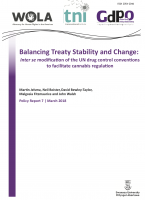The elegant way to end global cannabis prohibition: Inter se modification
Regions
Countries that embrace legal regulation find themselves in breach of international law. In this video, we explain a strategy to resolve those treaty tensions and to enable progressive and sustainable change at the global level.

Around the world, a growing number of countries have realised that cannabis prohibition has done more harm than good. It has led to heavy burdens on criminal justice systems, discrimination and marginalisation of various social groups, as well as damaging impacts on public health and security.
Since the 1970s, governments around the world have begun experimenting with lenient approaches toward cannabis. A number of U.S. states decriminalised cannabis possession for personal use, followed by a "quiet revolution” of decriminalisation and of legalisation of medical cannabis in Europe and the Americas.
In 2013, Uruguay became the first country in the world to introduce an all-encompassing system of legal regulation for cannabis use, distribution, and production. This major achievement coincided with similar victories in the U.S. states of Colorado and Washington, and a few years later in several more states. Canada’s bill C-45 to regulate cannabis will come into effect on October 17th, pilot projects for a regulated cannabis supply will soon start in the Netherlands and Switzerland, and several more countries are now considering to move in the same direction.
- Estimated number of people arrested for cannabis in the US and EU
- Arrest rates of cannabis possession in the US by race
- Footage of aerial spraying and medical cannabis in Colombia (Cannabis News Network)


